Alumni Archive 2018
December 2018
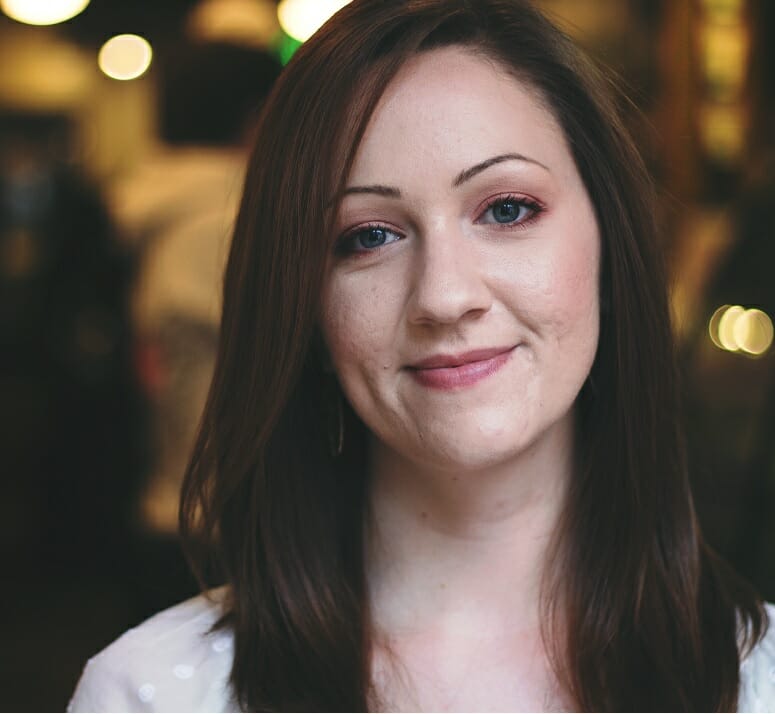 Name: Katie (Fluke) Thacher
Name: Katie (Fluke) Thacher
Major, Minor: English, Psychology
Year Graduated: 2014
Job Now: Senior Production Editor for ASCE
What you’ve been up to since graduation? Since graduation, I’ve been working for the American Society of Civil Engineers (ASCE). ASCE publishes over 35 scholarly journals of engineering research, and I work with the authors of that research to polish components of their articles and make sure they are consistent with our style. I perform many quality checks and help maintain multiple areas of production. I am also working part-time on a graduate degree in Communication Studies from Shippensburg University, building the skills and connections I need to transform my career from editing others’ work to creating and implementing my own creative content.
What is the best/most interesting part of your job? The best part of my job is the consistency. I have wanted to be a writer and editor since at least middle school, possibly earlier, but for a long time I struggled to believe it was feasible as a career choice. I heard often that it was impossible to get steady work as an editor and even harder as a writer. While I’m still working on the writing part, I’ve proven that consistent editing jobs exist. You just have to be willing to stretch to find them. I never thought I’d edit in a scientific field, but here I am.
What has been your favorite and/or most memorable on-the-job moment? I can’t say I have one specific moment that stands above the rest. Some of the most enjoyable moments, though, are when I catch major errors before print. It’s extremely rewarding to know I did my job well and protected my team and my employer from embarrassment or even litigation if it’s a copyright issue. And as all grammar police know, it’s personally satisfying to find an error and make it right.
How did our program help you prepare for your current job? My classes at Shepherd taught me the significance of accuracy, structure, and style in written communication. The department’s particularity in following a style guide, citing all sources, maintaining a consistent format, and other such meticulous things helped train my eye as a professional editor.
What advice would you give current students? I would encourage students to talk. Talk to your professors, talk to your advisors, find and talk to alumni in your field. The best thing I’ve done for my career is email coworkers at ASCE who work in the Communications and Marketing departments and ask, “Would you be willing to sit down with me for 30 minutes sometime and tell me about what you do?” They were happy to do so. These informational interviews gave me insight into my desired jobs, revealed specific skills I need to improve in order to succeed, and helped me create a list of goals that will guide me from my current position to the one of my dreams. I only learned these things because I initiated a conversation. So talk!
______________________________
November 2018
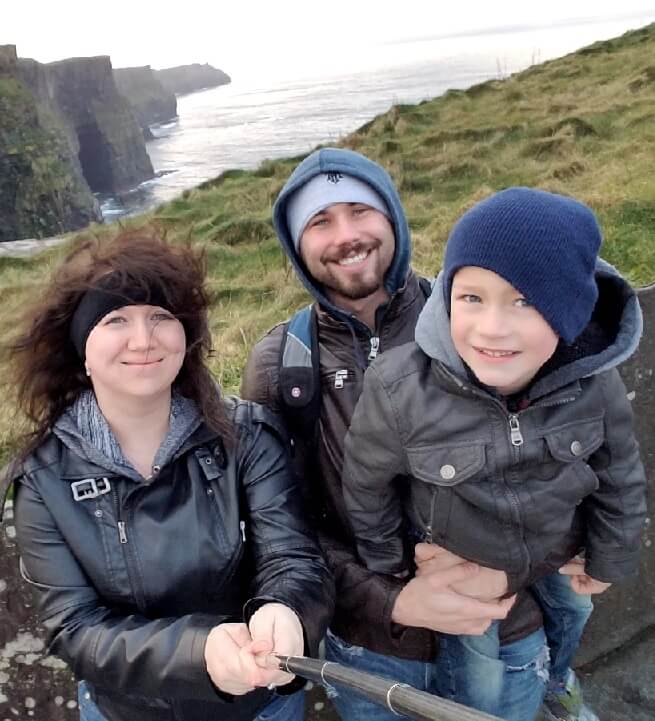 Name: Kathleen (Stritch) Huntsberry
Name: Kathleen (Stritch) Huntsberry
Major, Minor: English, Spanish
Year Graduated: 2013
Job Now: Manager with BB&T
What you’ve been up to since graduation? Since graduation I have been enjoying life. I had my son, Michael Patrick, my last semester of school, and he has been a joy. I married in 2015 to Shepherd Alumnus Gavin Huntsberry; we met at the Butcher Center in 2010. We have enjoyed family life as well as travelling. Since graduation I have been to Santa Fe, New York City, Jamaica, and most recently Ireland. In 2017 I met back up with the Rude Mechanicals to participate in their summer production of Andromache. I still deeply enjoy reading, writing when I can, and singing karaoke. My best friends are still classmates of mine from Shepherd: Shelby (Taylor) Miller and Leah Drummeter. Recently my husband and I began doing foster care and hope to grow our family. I strongly recommend anyone who has the space in their home to consider being a foster parent. The work doesn’t always feel rewarding, but these children need all the love in the world.
What is the best/most interesting part of your job? I certainly never pictured myself as a manager at BB&T, yet oddly enough I do find myself using my degree. I proofread emails for my colleagues that are being sent to upper management or critical clients; I assist our Hispanic community by utilizing my Spanish minor, and overall I find myself using communication and persuasion techniques that I attribute to my major. The most interesting part of my job, however, is getting to be out in my community and working with the public. BB&T does a lot of community service projects, and I greatly appreciate working for a company that wants to help our neighbors. I’m the team leader on an upcoming project partnered with Catholic Charities to purchase personal care items for our local homeless population. Projects like this really make my job a career to me.
What has been your favorite and/or most memorable on-the-job moment? Some of my most memorable tasks on the job have been being involved in financial literacy projects. These are instances in which we go to a school, or even recently a shelter, and help teach people smart tips for handling money and budgeting. I’ve heard jokes from my generation about how we were never taught to file taxes or balance a checkbook, and while sure, it is sort of funny no one thought we needed those life skills, it is also distressing to see how many people struggle to make their paycheck stretch. The goal of financial literacy is to help young people understand the products and services available to help them achieve financial wellness.
How did our program help you prepare for you current job? While I am not using my degree in English directly, I would still say that my education at Shepherd University helped to prepare me for my career because it shaped me into a critical, independent thinker and someone capable of articulating my opinion and negotiating my position. I went through two promotions in six months, and although I am the youngest at my branch, I am the second in command. (Thanks, Dr. Nixon, for telling me to apply for jobs I didn’t feel qualified for!) I can also remember being shy and quiet in my Spanish classes, but then I would write an essay on test days and Dr. Büdenbender would write notes telling me to speak up more in class, that I spoke Spanish well. Just last week I assisted a client entirely in Spanish as we discussed building credit, and I took a credit card application from him.
What advice would you give current students? If you’re considering Shepherd University, I would certainly recommend it. The town is sweet and relaxing. We bought our home just outside of town; that’s how much we loved it. My class sizes were never suffocating, and I always had professors who would make time to talk with me after class or in office hours. My professors genuinely cared about my education and seeing me succeed. My advice to current students would certainly be to have faith and don’t be afraid to apply for that job you think you won’t get. Six years ago I never would have imagined my life looking the way it does now. I certainly wasn’t sitting in creative writing classes picturing myself in a suit and opening accounts. Life isn’t going to go the way you think, but that doesn’t mean it will be disappointing. Just be awesome and find something that makes you happy—even if it wasn’t what you studied at school and wasn’t what you picked for career day in second grade. Your education is going to lay the ground work for you to get exactly what you want out of your career.
______________________________
October 2018
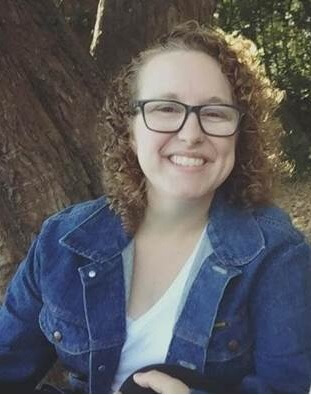 Name: Katie Butler
Name: Katie Butler
Double Major: English (Literature) and Economics
Year Graduated: 2014
Job Now: Economist at The Bureau of Labor Statistics
What you’ve been up to since graduation? Right after graduation, I took a seasonal position with the National Park Service at Antietam National Battlefield for about a year, which was an amazing experience. I had the opportunity to work with some of the greatest people I’ve ever met and meet tourists from all over the world. I left NPS to take an Economist position with the Bureau of Labor Statistics in Washington, DC, and I’m still there today! When I’m not working, I love to read and write (especially poetry—shout out to my main lady Emily Dickinson), go on outdoor adventures with my dog Luke, and play the piano. I’m also very involved in my women’s ice hockey team, the Hagerstown Mayhem, so you can usually catch me at the rink on the weekends when we’re in season.
What is the best/most interesting part of your job? The “Economist” job title has a wide variety of meanings at the Bureau of Labor Statistics. Some Economists work more closely with statistics. Some do more coding and building of sampling systems. My job as an Economist is mostly to teach. I train Field Economists how to use statistical sampling methods to collect price data from both big and small companies all over the country. We then take this data and use it to compile indexes that track different economic indicators, such as inflation. That being said, I think the most interesting part of my job is having the opportunity to teach all different types of people from all different parts of the country. Seeing your students leave and excel in their jobs and knowing that you had a part in that success is very rewarding.
What has been your favorite and/or most memorable on-the-job moment? I’d probably have to say that most of my favorite on-the-job moments have stemmed from the opportunity to work on a series of videos that were published to the BLS YouTube channel. I and team of coworkers from various offices were chartered to try and create a series of informational videos from scratch. We researched, created a script, storyboarded our ideas, and finally used a video animation software to create some really high quality resources for the public to learn about what BLS as an agency provides. Following the publication of these videos, I had the chance to talk one-on-one with the Interim Commissioner of BLS about these videos, which was definitely one of my favorite experiences of this job so far.
How did our program help you prepare for you current job? My English degree has been invaluable in my current job in so many ways. When teaching, both written and oral communication are hugely important. My English degree has taught me how to write and speak with confidence as well as prepared me to create lectures, give helpful feedback to coworkers, and think both creatively and abstractly.
What advice would you give current students? The biggest advice I’d give current English students is don’t limit yourself in terms of career options with your degree. An English degree provides you with some of the most versatile skills you can have in the workforce—communication and critical thinking. Know your worth and have confidence in the skills that you hold because they’re much rarer and more valuable in the workforce than you may imagine. Besides that, I always think it’s important to have a side hustle. Aside from work, do something that makes you happy, grows your mind, or makes you a few extra dollars. Being a well-rounded individual is crazy important in life. You never know when an opportunity could present itself to make that side hustle that you’re so passionate about your full-time gig. So, get out there. Make a difference. Find something you love and hold onto it. Be kind to those around you. Don’t sweat the small stuff. Support your community. Oh, and read all the poetry you can get your hands on.
______________________________
September 2018
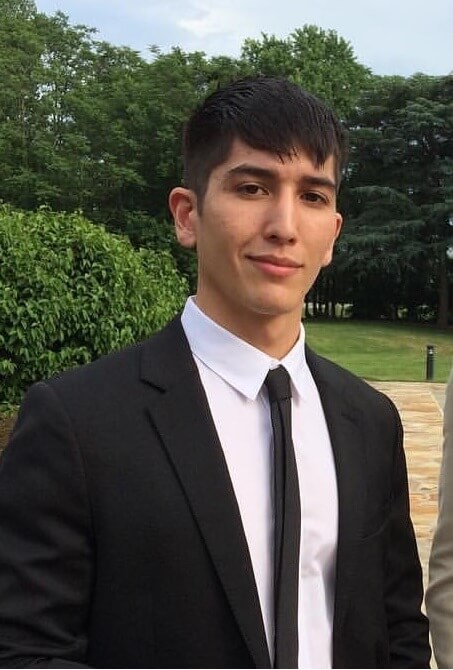 Name: Neal Crosson
Name: Neal Crosson
Major, Minor: Spanish, Psychology
Year Graduated: 2017
Job Now: “Auxiliar de conversación” (Language Assistant) at two bilingual elementary schools in Murcia, Spain.
What have you been up to since graduation? Since graduation I have moved to Spain to work as an English teacher. I have been living in Spain since this past September.
What is the best/most interesting part of your job? The most interesting part of my job is being involved in Spain’s initiative to become an English bilingual country.
What has been your favorite and/or most memorable on-the-job moment? My favorite moments are walking into class every morning and being enthusiastically greeted by the kids.
How did our program help you prepare for your current job? The Shepherd University Spanish program helped me immensely when moving to Spain. In other words, I was able to move to a foreign country without worrying about a language barrier. Additionally, I am better able to teach English as a foreign language because I have dedicated myself to the study of a language that is not my own.
How has speaking another language helped you in your career and life overall? The ability to speak Spanish is certainly helpful in Spain. In my job I work with primary school age children who have a fairly low level of English proficiency. I can better explain concepts and clarify doubts in their mother tongue, whereas if I only spoke English I could not.
What advice would you give current students? I would advise current students to be prepared always to meet changing life circumstances with a sense of optimism and determination. If I had been asked the first semester of my graduation year where I would be living and working the following year, I could not have imagined that it would be in Spain. I have spent almost a year in this country and now I am preparing to spend another year, this time earning my Master’s degree in Bilingual Education. I believe that opportunities are everywhere when one knows where to look.
______________________________
August 2018
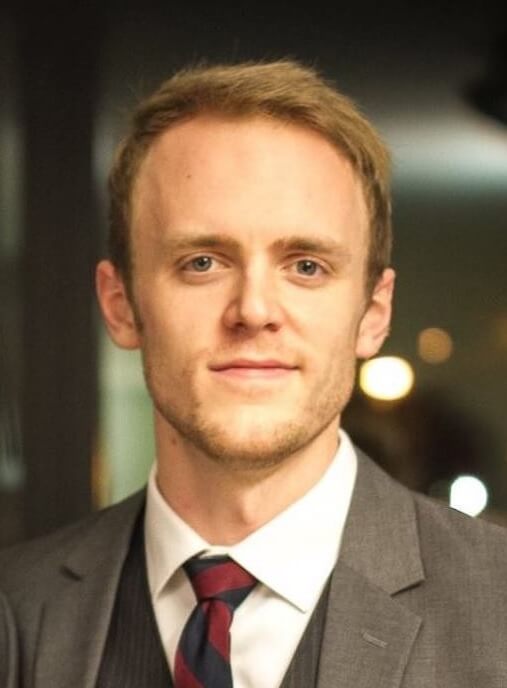 Name: Matt Myers
Name: Matt Myers
Major, Minor: Secondary English Education
Year Graduated: 2013
Job Now: Graduate Assistant in the Office of Graduate Student Assistantships and Fellowships at The George Washington University
What have you been up to since graduation? I spent a year teaching 10th grade Honors English at Washington High School in Charles Town. I enjoyed every moment of it but ultimately decided to return to Shepherd for the Master of Arts in College Student Development and Administration program, from 2014 to 2016. I was fortunate enough to teach a section of English 101 at Shepherd during my Master’s degree. Shortly after finishing at Shepherd, I began working on my Doctorate of Education at The George Washington University (GW) in Washington, D.C. I just finished my comprehensive exam for my program, and I’m set to finish coursework in about a month, so I should be starting to work on my dissertation this fall!
What is the best/most interesting part of your job? I find the most interesting parts of being a student to be the challenge of doctoral coursework and the variety of people I’ve met. My cohort mates have been diverse and supportive, and plenty of my instructors have been scholar-practitioners with fascinating experiences. As for my assistantship, I enjoy the part of the position that involves serving as a teaching assistant for a course that equips new graduate TAs with teaching skills for their eventual classrooms. I also really love D.C. culture!
What has been your favorite and/or most memorable on-the-job moment? Serving on the search committee for a new dean has been very memorable. The first committee meeting was great. Engaging in discussion and debate with my fellow committee members of diverse roles and backgrounds left me with a greater appreciation for collegial respect and progress. More recently, the best times have been biking to the National Mall to eat lunch on warm spring days.
How did our program help you prepare for your current job? Well, learning MLA writing style didn’t prepare me for APA! All jokes aside, I value my time at Shepherd. My courses (in the Department of English and Modern Languages especially) helped me foster a true appreciation of scholarship. I believe I was a Junior when I realized that being a student was no longer a chore; it was something I genuinely enjoyed. From writing and public speaking to analysis and critical thought, the skills that the SU English program helped me build are relevant to my everyday work.
What advice would you give current students? I would say, “Keep at it” and “Take it one day at a time.” School work, career demands, and life expectations can be overwhelming, but challenge is healthy, and a journey is composed of individual steps. To balance that idea: don’t put off happiness. The mentality of “once I _______, then I’ll be happy” is poisonous. Appreciate the good things in life.
______________________________
July 2018
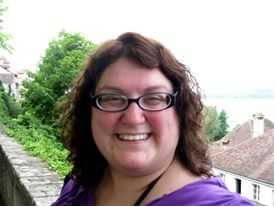 Name: Erin Nissley
Name: Erin Nissley
Major, Minor: Mass Communication, Journalism
Year Graduated: 2001
Job Now: Assistant Metro Editor of The Times-Tribune in Scranton, Pennsylvania
What have you been up to since graduation? I was lucky enough to get a job in journalism before I even graduated. I started at The Journal in Martinsburg, West Virginia one week after graduation. I covered crime and courts there for two years and then moved to State College, Pennsylvania in 2003 to take a reporting job at the Centre Daily Times. It was my first experience with a big college town. In addition to covering crime and courts there, I wrote feature stories about Penn State home games. It was so fun to stand on Beaver Stadium’s field, interview Joe Paterno, and find the best tailgates to write about. I knew nothing about Penn State coming in, but I’m proud to say I’m a fan now. I’ve also been lucky to travel quite a bit. I’m in the midst of a “bucket list” goal to visit every state in the US, and I’ve been to Europe twice, including a visit to Liechtenstein. I have a rescue mutt named Ruff Waldo Emerson, who keeps me busy, too. On the weekends, you can usually find me out on one of my town’s many hiking trails or in the kitchen, trying new recipes with locally sourced, seasonal produce.
What is the best/most interesting part of your job? I love getting to know the communities where I live and work. As a reporter and an editor, it’s my job to be curious, to talk to strangers, and to deliver the news that people need to know. Being a good journalist means being connected to the community. I’ve been lucky to live in cool towns that have a lot of history and culture.
What has been your favorite and/or most memorable on-the-job moment? While at the Centre Daily Times, I wrote dozens of stories about the disappearance of Centre County District Attorney Ray Gricar. He took a day off from work on a sunny Friday in April 2005, went for a drive in his bright red Fiat, and was never heard from again. The car was found in a nearby town a day later; the hard drive from his laptop was found in a river after several months. As I covered that story, I appeared on Nancy Grace and other cable news shows to talk about the case and the developments. I still stay in touch with one of Gricar’s nephews, and I hope one day we’ll all find out what happened. In addition, Scranton is a great town—Hillary Clinton’s father was born here, and she still visits occasionally. Former Vice President Joe Biden was also born here and comes back often. In fact, when Barack Obama won his first term, I spent the evening watching returns with two of Biden’s childhood friends and wrote a story about their deep pride in seeing an old friend win. Scranton and the surrounding region have gotten a lot of attention from national media, especially during presidential elections, because of its blue-collar, pro-union history. In the last election, the newspaper covered visits from Donald Trump, Hillary Clinton, and Joe Biden. It’s an exciting town to write about, and I consider it my adopted hometown.
How did our program help you prepare for your current job? Strangely enough, I enrolled at Shepherd with a goal of becoming a teacher. Thanks to a suggestion from Professor Ethan Fischer in the Department of English and Modern Languages, I took a journalism class and met Dr. Jim Lewin, who got me involved with The Picket. After that, my career goal was pretty much set—journalism.
What advice would you give current students? While classes with Dr. Lewin, Professor Sally Hresan, Dr. Kevin Williams, and Dr. Sylvia Shurbutt gave me the foundation for what I do every day, my internships really gave me an edge when it came to getting a job. I did two summer internships at newspapers. During the first, at The Journal in Martinsburg, I wrote 70 stories in 10 weeks. Shepherd’s Career Center also helped me get an internship doing community outreach at the Appalachian Trail Conference in Harpers Ferry. I also worked part-time for The Shepherdstown Chronicle from my sophomore to my senior year. All of my internships were paid, and getting that experience to put on my résumé was priceless!
______________________________
June 2018
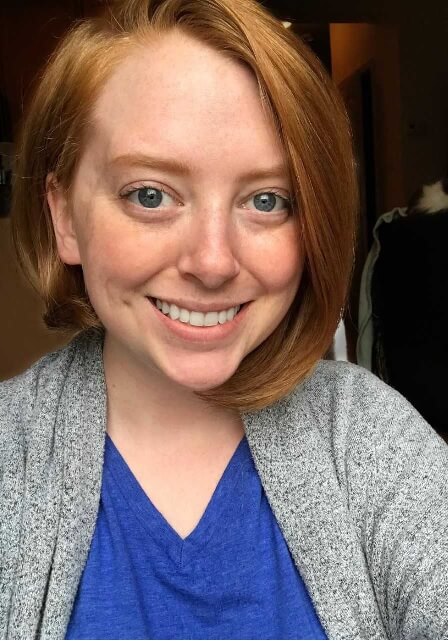 Name: Lauren Coffey
Name: Lauren Coffey
Major, Minor: English (Creative Writing), Communication (New Media)
Year Graduated: 2014
Job Now: Technical Writer for the U.S. Coast Guard
What have you been up to since graduation? I was one of the lucky ones who got a job just one month after graduating! So it’s been 9 to 5 pretty much since I graduated, which I’ve found I’m actually partial to. Who knew a Type A would appreciate structure and schedule? On the side, I also do freelance editing and beta reading for unpublished authors. There are some seriously brilliant people out there writing incredible stuff, and it makes me beyond enthusiastic for the future in the publishing world.
What is the best/most interesting part of your job? Definitely those miscellaneous tasks. I love a good standard operating procedure manual, but getting to exercise the more creative parts of my brain is refreshing.
What has been your favorite and/or most memorable on-the-job moment? We did a total overhaul of our building’s property auditing system. It sounds super boring, but being involved in the process was actually a lot of fun. It was a great team of people, and it was more than a year’s worth of work, creating documentation and updating databases. When I finally got to see the auditing process in action, it felt really awesome to have been pivotal in its success!
How did our program help you prepare for your current job? It’s easy to say I wouldn’t be qualified for my position without an English degree, but it’s more than that. Shepherd really prepared me for the professional sector of writing and editing by constantly challenging me and helping me to grow as both a life-long English language student as well as a critical thinker. While editing and writing are certainly the main parts of my job, the ability to work hard under pressure, interact professionally with colleagues, explain my ideas succinctly to an audience, and other countless “real world” skills all came from being a student in the Department of English and Modern Languages at Shepherd.
What advice would you give current students? I was told countless times (jokingly and not) that an English degree would leave me jobless or teaching. As someone who attempted an English education degree before realizing two semesters in that I absolutely hated teaching, I can tell you neither of those sentiments is true. My advice is to study what you love, and if that happens to be English, then know that the opportunities provided to those who can effectively write and critically argue a point will be in abundance. If there’s one thing I’ve learned being in a professional office environment surrounded by folks who make a lot more money than I ever will, it’s that they still can’t write worth a crap, will constantly be in awe of my ability to know the difference between “affect” and “effect,” and are willing to pay to have other people (English majors) make sure they don’t sound like they haven’t had an English class since the third grade. And if editing isn’t your thing, the life skills you’ll obtain in the Department of English and Modern Languages are more than enough to qualify you for countless positions because the ability to write well is in high demand no matter what company, business, or organization it is.
______________________________
May 2018
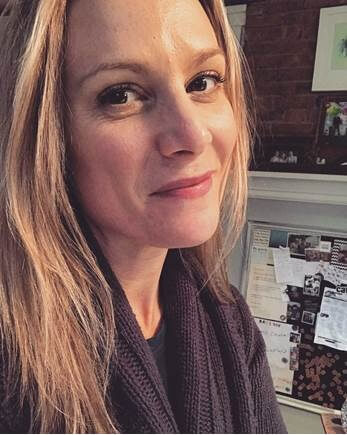 Name: Stephanie Nasteff-Pilato
Name: Stephanie Nasteff-Pilato
Major, Minor: English, Theater
Year Graduated: 1998
Job Now: Voice-Over Actor (e.g., Dannon Lite & Fit, Progresso Soup, Toyota Prius, Lysol commercials)
What have you been up to since graduation? In the summer after graduating from Shepherd, I followed my dream of being a professional actor to New York City. During my early years in New York, I continued my acting training at the acclaimed William Esper Studios. During which time, I worked as a nanny, a fragrance model, an assistant to a wardrobe stylist, a cater waiter, a sales assistant at a major fashion house, and of course I waited lots & lots of tables. In August of 2000, I married my college sweetheart, Eric Pilato (Class of ’97 Painting major, Printmaking minor). My acting training finished in June of 2001, and during that summer I co-founded a theater company called Crooked Neck Productions with two of my fellow Esper grads. Then, the towers came down. We gathered ourselves together and pressed on, producing 8 plays over the next 3 years. It was a special time of healing, discovery, grit, and exploration. At the same time that I was producing and acting with Crooked Neck, I completed a 500-hour yoga teachers’ training program. While teaching yoga, I had a serendipitous turn of events, which led to meeting my agents at Innovative Artists, who signed me on in their commercial division with a focus in voice-overs, in 2002. I booked the first job I ever auditioned for: a PSA encouraging pregnant women to quit smoking. In the fall of 2003, I went on sabbatical at the yoga studio and have been supporting my family with voice-over work ever since. Eric and I have two wildly creative and hilarious kids, Jesser (13) & Esme (8.5), and a house full of animals. In 2010, we left Manhattan and settled outside the city, in Maplewood, NJ.
What is the best/most interesting part of your job? There are so many things I love about my job that are very specific. It’s almost like a creative puzzle to be able to tap into the sound that best supports the idea of the commercial, blends just right with the chosen music, and to fit it all in, in just 15-30 seconds. I love working with the writers, taking direction, and delivering the read that brings the whole commercial together. It’s a very satisfying process, to be able to put the finishing touch on the project and make it sound just right. Since I don’t have a traditional work schedule, another great bonus of my career has been the ability to spend a lot of time with my children. Although the unpredictable nature of auditions, holds, and bookings can be a harrowing at times—running around for last-minute calls and rescheduling family vacations around last-minute jobs—making it all work within the construct of a busy life is never dull. I feel very lucky every time the phone rings and every time I walk into a booth to record.
What has been your favorite and/or most memorable on-the-job moment? That’s a tough one, because each project I work on is unique, and requires a different energy and attack—and that’s a huge piece of what I love about what I do. But, two highlights come to mind. A few years ago, I was able to fulfill a lifelong dream of being a part of Sesame Street, recording an informational video on how their global outreach and multi-cultural characters empower young girls around the world. And year’s Super Bowl viewing party was extra special, as my whole family was together to hear my Tide Ads play throughout the big game.
How did our program help you prepare for your current job? Voice-over work (and all acting really) starts with the text. So, my English and Theater training gave me two complimentary ways into the written word. One idea that I come back to all the time in my work is that my job is to serve the script, however mundane or seemingly nonsensical it may seem. The language used in advertising is incredibly efficient, distilling big ideas into catchy little phrases used to influence perception and buying patterns. My job is to understand the larger meaning of the script, to infuse that meaning into the read, so the inflection, tone, and energy convey the intended effect. It may sound like a stretch, but reading Shakespeare or Chaucer aloud takes the same kind of skill. One must glean the meaning of the text to be able to deliver that meaning, no matter what words are used in the copy. I honed and developed my reading skills in the classroom, during my English studies, and my performance skills in the Studio Theater at Sara Cree Hall (may it rest in peace). Both programs have informed the way I approach a script, whether it be commercial copy, a play, or the narration of a documentary film.
What advice would you give current students? The best advice I can give to the current students would be to take advantage of the small class sizes and individual attention one can receive at Shepherd. Some of my fondest memories are of round table discussions in my Hamlet in Context class, or in American Ethnic Literature, History of the English Language, or in rehearsal for one of the many plays I was fortunate enough to perform in while at Shepherd. Take advantage of the opportunity to explore your personal interests through your studies. Go big! Go deep! Get to know your professors on a personal level and tune into their specific areas of interest. Read and read some more! Enjoy this very special time, where learning and exploration are at the top of your priority list. It is a precious and fleeting moment. Drink up all the language you can, and then take it with you wherever your personal path my lead. Read stories. Listen to stories. Tell stories. Allow those stories to deepen your connection to all that it is to be human. And, take that connection with you out into the greater world, into your professional life, and beyond.
______________________________
April 2018
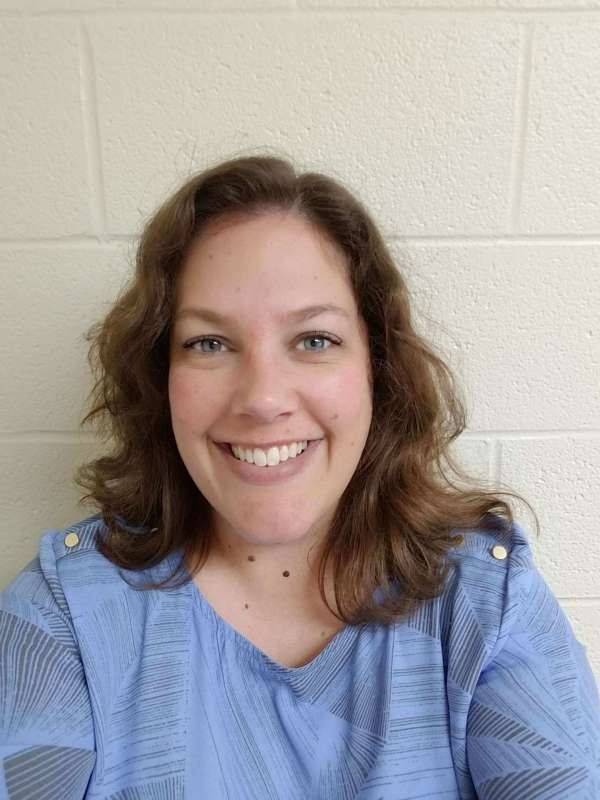 Name: Melanie Snyder
Name: Melanie Snyder
Major, Minor: English, Biology
Year Graduated: 2013
Job Now: Financial Aid Counselor at Shepherd University
What you’ve been up to since graduation? I have mainly been raising my kids and working. I continue to read a lot, as that will always be my passion. Just after graduation I served as an AmeriCorps VISTA member for the Potomac Valley Audubon Society. I helped to research new funding opportunities, write grants, and track volunteers.
What is the best/most interesting part of your job? I specifically work with the institutional aid (scholarships and waivers) and state aid (Promise Scholarship and the West Virginia Grant). I love being able to work with students to figure out their financial aid, to show them that it’s best to be proactive and not to be scared to ask questions. I also love being able to tell students that I have been able to award them scholarships or that they are eligible for a grant that they didn’t previously know about.
What has been your favorite and/or most memorable on-the-job moment? My favorite moments are when I am explaining how financial aid works, and a student is engaged and asking questions, or when their eyes light up when they “get it.”
How did our program help you prepare for your current job? I believe being an English major has played a big part in my current position. Through my studies and classes, I developed strong oral and written communication skills. I also honed my abilities as a critical thinker, which is important in my position as each situation and student is different and requires an adaptable approach.
What advice would you give current students? Don’t think for one second that being an English major will only lead to teaching or editing. Both are awesome career paths of course but are far from the only thing available to someone with the communication, organizational, and thinking skills earned as an English major. As for students in general, my advice would be to listen to your gut. Take if from a failed Environmental Studies/Biology major, you have to work hard (regardless of your major) to succeed in college, but you also have to listen to that little voice inside of you that will tell you which educational path and program will work best for you.
______________________________
March 2018
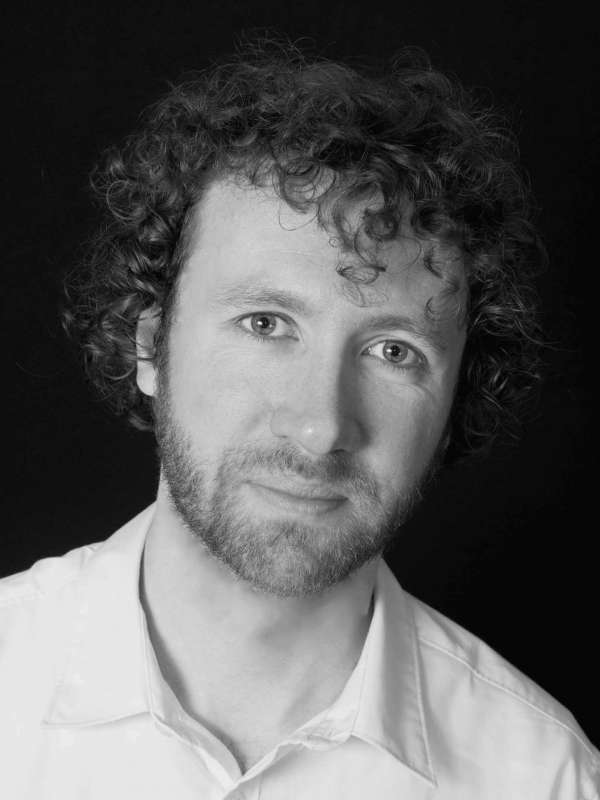
Name: James McNeel
Major, Minor: English, Theater
Year Graduated: 2001
Job Now: Managing Director at City Theatre Company in Pittsburgh, Pennsylvania
What you’ve been up to since graduation? I have had the great fortune to work on various projects in the arts, as well as live in some extraordinary places. After graduation from Shepherd, I studied arts management in grad school at American University while being able to apply my English degree by working as a literature specialist for the National Endowments for the Arts, the nation’s federal cultural agency. At the NEA, I oversaw the literary fellowship program, assisted with grant-making for nonprofit presses, literature organizations, and festivals, along with the launch of such national initiatives as Poetry Out Loud, Shakespeare in American Communities, the National Book Festival, and Operation Homecoming (a program that paired writers with veterans from Iraq and Afghanistan). I then moved to New York City where I worked as a consultant for numerous arts organizations and artists, ranging from opening The Times Center—owned by The New York Times—to advising the legendary Arthur Mitchell and Dance Theatre of Harlem. In my final year in New York, I worked with the oldest Off-Broadway theater, Cherry Lane, located in Greenwich Village. It was there that I received a call from my Shepherd University mentor, founder and producing director of the Contemporary American Theater Festival, Ed Herendeen, asking if I had any interest in returning to Shepherdstown and working at the Festival. I accepted the position in 2010 and was managing director at CATF for four seasons during the opening of the Marinoff Theater (Phase II of the Center for Contemporary Arts), the festival’s 100th play produced celebration, its first Off-Broadway transfer (Uncanny Valley, October 2014), four commissions, 10 world premieres, and 20 new plays overall. While at CATF, I sat on the boards for the Shepherdstown Visitors Center and the Jefferson County Tourism Commission and worked closely with the Shepherd University Advancement Office. Including my intern years during college, I spent seven seasons with CATF.
What is the best/most interesting part of your job? There is never anything routine about managing an arts organization; every day is a challenge and a privilege. The most interesting part of the job is facilitating the wondrous creative energy and ideas of the professional artists and seeing the extraordinary craft and skill they bring to the job—and to the world. The best part is the joy of sharing these unique moments with an audience and seeing the inherent enrichment that great live theater can provide its community. In a divisive period such as the one we’re living in now, we desperately need things that can bring us together. Art can and must do this.
What has been your favorite and/or most memorable on-the-job moment? Every opening night at the Contemporary American Theater Festival. There is no greater professional feeling or sense of accomplishment than seeing that intense sprint and madness come together. (I also served as Sir Ian McKellan’s body guard one night in New York.)
How did our program help you prepare for your current job? I am huge proponent for the oft-misunderstood English major. The critical thinking, public speaking, and written expression skills and abilities I gleaned from the study of literature at Shepherd have prepared me in ways I would never have imagined. My love for humanity—and my hope that it’s not entirely being ruined by the capitalist set—comes from the debates and discussions and deep-dives I had in Knutti Hall those many years ago. But I owe my entire lot in life, career, and personal passion to the fact that I stumbled into the (now gone) Sara Cree Studio Theater for a random theater class all the way back in 1997. My entire worldview and trajectory changed with that and the discovery that theater was a thing and it could be my career. I learned more in the theater minor at Shepherd—with its affiliation with CATF—than most do in a four-year undergrad or graduate experience. Ed Herendeen taught me, instilled in me a love for new plays, and let me go out and be part of something magical. I am forever grateful to his gift to me and to Shepherd for giving it a platform to play, to fail, to make believe.
What advice would you give current students? Explore the world. Don’t ever settle. Question the habits of those who run with the mainstream. Read. Detach from the gadgets. See some art. Fall in love. Again. And Again. Live wild as long as you can before reality forces you to commit. Push your comfort zone. Be nice. Ask about other people—and mean it. Don’t be in a rush; the bullshit will find you soon enough. Drive across the country—at least twice. Live in New York City. Be curious, always. Find a reason to visit Shepherdstown every year after you graduate; you have no idea how special it is until you’re gone (but definitely go—there’s too much to discover out there to be ignored).
______________________________
February 2018
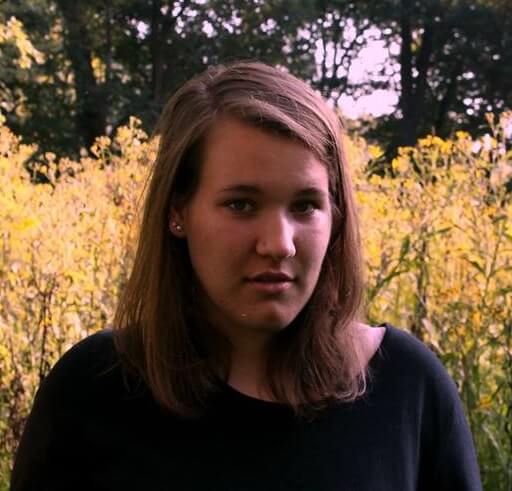 Name: Kelsey Stoneberger
Name: Kelsey Stoneberger
Major, Minor: English (Creative Writing), Journalism
Year Graduated: 2016
Job Now: Editorial Intern with Tin House Magazine
What you’ve been up to since graduation? I stuck around Shepherdstown for a month after graduation before heading back home and living with my mom for the summer. I applied for AmeriCorps NCCC halfway through summer and got offered an acceptance a few weeks later. AmeriCorps NCCC is a 10-month residential program for 18 – 24 year olds. I was granted the opportunity to travel the Pacific Northwest and change the world simultaneously. AmeriCorps is known as a “domestic Peace Corps,” and that rings true. I traveled to California, Washington, and Nevada and immersed myself within communities and helped them accomplish a variety of things. I worked with Habitat for Humanity, The San Lorenzo Valley Habitat Restoration Project of The San Lorenzo Valley Women’s Club, Camp Fire USA, and The Boys & Girls Club. Not only did I get to jump into different jobs, but I also realized that I had an interest in many things I wasn’t aware I liked.
What is the best/most interesting part of your job? I was initially going to say that being around creative people and feeding off of that artistry is the best part of my job, but the best part for me is pushing myself and learning more about the career I know I want. Learning is not always the easiest thing; sometimes you feel like you’re doing something wrong or you aren’t up to speed with everyone else, but that’s okay. That’s all part of getting better at something, and if that passion is there, you have nothing to worry about. When the assistant editor needs nonfiction (essays, creative stories, short memoirs) fact-checked, I get to do that. That’s really cool to me because it feels more hands-on with the material that Tin House is publishing.
What has been your favorite and/or most memorable on-the-job moment? My most memorable on-the-job moment would probably be a creative nonfiction essay we all got to read recently for the spring 2018 issue. I kind of fell in love with it and read it multiple times. Although I can’t say anything about it, it’s written so well. I found out that our managing editor, Cheston Knapp (his book of essays Up Up, Down Down drops February 2018), selects pull-quotes for each issue. I really wanted to be a part of that for the creative nonfiction essay the interns got to read. One day while I was at the office, I knocked on his door and asked if I could sit with him while he picked pull-quotes so I could get a sense of that process. Before I left, I told him I selected pull-quotes for the same essay and would love to show him what I had, and he was really into the idea. Not only did I get to learn something new, but I also got to show him my talent outside of the work I normally complete as an intern.
How did our program help you prepare for your current job? The Department of English and Modern Languages at Shepherd pushed me to be uncomfortable multiple times. I cried; I got mad; I laughed. I don’t know everything about being an editorial intern because I jumped from working at a university literary and art magazine to Tin House, which is a huge deal. The editors don’t expect me to know everything, but they expect me to do my very best, which is something the professors at Shepherd expected from me. The professors who make up the English program are something else. They don’t take no for an answer; they aren’t friends with excuses, and they have some of the biggest hearts for teaching literature and creative writing I’ve ever seen. They all operate on a whirlpool with no intention of slowing down, and that is what I love about them. The professors I connected with the most taught me to know my worth as an individual and a woman, taught me to keep pushing because we never know the answer right away, taught me to be open to growth, taught me that there will be opinions you won’t be fond of but you’ll have to endure them anyway and how you move forward after that will show who you are more than anything else.
What advice would you give to current students? Do what makes you happiest. Your parents or guardians or friends or whoever, they’re all going to have something to say about what you are doing or will do (and it won’t necessarily be negative but sometimes it will be). It is important to remind yourself to do the thing that makes you smile, to do the thing that makes you feel you are making a difference in the world and your own life, to do the thing that begins at your center, where that burning passion exists. Maybe you won’t figure this out right away, and that’s okay, because all of your experiences morph together to make you who you are. Keep figuring out who you are and take time to learn the place around you. When you start to get into low points, remind yourself why you made such a big leap in the first place.
______________________________
January 2018
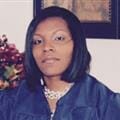 Name: Saundra Johnson Harvey
Name: Saundra Johnson Harvey
Major, Minor: Spanish, Sociology
Year Graduated: 2012
Job Now: Branch Manager for a national employment service
What have you been up to since graduation? I married an active duty Lt. Colonel in the Army and relocated to Suffolk, Virginia. I spend a lot of time running long-distance races and training for those races. Initially after graduation I wanted to teach high school Spanish. I had the opportunity to substitute teach for Berkeley County School System for a little over a year. Obtaining my degree in Spanish to be able to teach was a career-change opportunity for me. I was a non-traditional student who had returned to college after having a family and a first career. After substituting, I decided to return to my former career in the staffing industry. I relocated to Hampton Roads, Virginia and am a Branch Manager for a Nationwide Employment service. I also tutor Spanish speakers through an ESOL program in coordination with Suffolk Literacy Program and Catholic Charities.
What is the best/most interesting part of your job? Helping others to find their careers.
What has been your favorite and/or most memorable on-the-job moment? My most memorable moments on the job will always be receiving thank you cards, messages, and notes from candidates who struggled finding employment for various reasons from being a military spouse always in transition to a person who may have had legal issues that have hindered him or her from finding viable employment.
How did our program help you prepare for your current job? The program helped me prepare for my current job because my job requires me to engage with not just bilingual speakers for the benefit of finding employment for my candidates and filling open positions for my clients but also to be able to work with a very diverse population of professionals.
How has speaking another language helped you in your career and life overall? I have a lot of clients who have a bilingual requirement for some of their open positions. Because I am able to connect with bilingual speakers, I am able to assist them better with finding employment for bilingual job seekers. I love to travel. I really love to travel to Spanish-speaking countries. When I was in the program, I had the opportunity to travel to Guatemala and Costa Rica. These immersion experiences were life-changing for me. Through my travel, I have learned how diverse a language can be and how language has such a strong influence on culture and how culture has a strong influence on language.
What advice would you give current students? Embrace It! Use it! Network with it! Don’t simply study the language; study the culture of the people. When studying a foreign language, you benefit so much more when you learn to use it outside of the classroom.